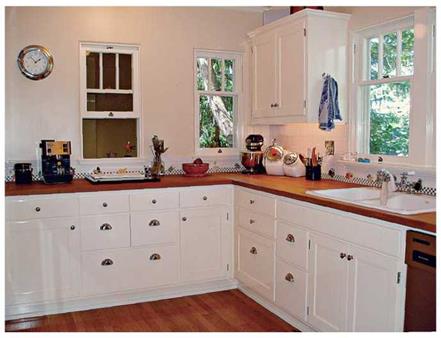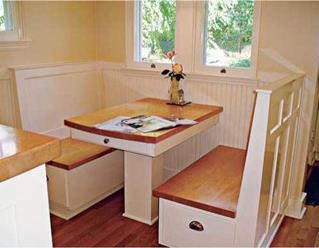Countertops for Kitchens and Baths
Most materials in this section require special training and equipment for installation. In fact, solid-surface and stone-polymer countertop makers will sell counter stock only to certified fabricators. Some materials, such as plastic laminates, can be successfully installed if you’re handy. But,

|
|
CHARACTERISTIC |
PLASTIC LAMINATE |
SOLID SURFACE |
QUARTZ COMPOSITE |
CERAMIC TILE |
STONE |
CONCRETE |
WOOD |
|
Durability, scratch resistance Fair |
Excellent* |
Excellent |
Good |
Goodt |
Good |
Fair! |
|
|
Ease of cleaning |
Excellent |
Excellent |
Excellent |
Fair§ |
Excellent |
Good |
Fair |
|
Stain resistance |
Good |
Good |
Excellent |
Fair |
Fair |
Poor |
Poor |
|
Water resistance |
Good |
Excellent |
Excellent |
Fair |
Good |
Good |
Poor |
|
Heat resistance |
Poor |
Fair |
Good |
Excellent |
Excellent |
Excellent |
Poor |
|
Expense |
$ |
$$$ |
$$ to $$$ |
$$ |
$$$ |
$ to $$ |
$$ |
|
Material scratches, but scratches are easily sanded out. f Durability depends on type of wood and finish; wood is generally a bad choice near sinks and water. t Harder stones (granite) wear well; softer stones (soapstone) scratch and stain easily. § Glazed tiles resist stains, water, and heat; but grout joints deteriorate if not sealed and maintained. |
as you’ll see, desirable details, such as wrapped front edges and integral backsplashes (no seams to leak!), are best fabricated in a pro shop. All in all, it’s smarter to choose a reputable installer than to try installing a countertop yourself. Tile countertops are discussed in Chapter 16.
The wide array of countertop colors, materials, and details (such as edges and backsplashes), give you tens of thousands of combinations to choose from. Here’s help narrowing your choices.
Plastic laminate, a tried-and-true surface (often called Formica® after a popular brand), accounts for more than two-thirds of all countertop installations. Standard laminate is only Мб-in. thick, so it is typically glued to a %-in. particleboard substrate to lend rigidity and ensure adequate support. Plastic laminate remains so popular because it’s tough, stain – resistant, quite economical, and available in a great range of colors and patterns. There are also extra-thick and fire-resistant laminates.
One disadvantage is that the seams can degrade and admit water. And once the substrate is water damaged and the laminate is lifting, the countertop is beyond repair.
Solid-surface countertops began with DuPont’s Corian®, which is still the best-seller in this category. Most brands are polyester or acrylic resins with a mineral filler. Solid-surface countertops have a lot going for them: They’re water and stain resistant; nonporous and easy to clean and thus great for food prep; and leakproof because they have seamless, chemically bonded backsplashes and integral sinks. Unlike laminates, solid-surface sheets are the same material top to bottom, so if you scratch them or put too hot a pot on them, you can sand out the blemishes. Most brands come with a 10-year warranty. Note that this material is generally expensive.
Quartz composites are a new and rapidly growing group that includes brands such as Zodiaq® and Silestone®; the blend is roughly 93 percent quartz and 7 percent polymers and pigments. Quartz composites have many of the virtues of stone countertops and few of the failings. Quartz composites are scratch, heat, and stain resistant; completely nonporous so they’re easy to clean; and less likely to fracture during transit because mineral particles are uniformly dispersed and free from the imperfections of natural stone.
Plus, a 10-year warranty is standard. However, these composites are expensive. And stone connoisseurs will know the countertop is not natural stone because of its uniformity.
Ceramic tile is beautiful and durable. Its great variety of colors, shapes, and sizes allows almost unlimited freedom to create your own patterns. Glazed tiles themselves are largely resistant to heat, water, stains, and scratches. Tile can be applied successively over a plywood substrate or a mortar bed, and a diligent novice can install it successfully. Tile prices vary widely, and thus can fit almost any budget. But its grout joints are relatively fragile, easily stained if they’re not sealed and maintained, and tend to collect crud. Also,







Leave a reply